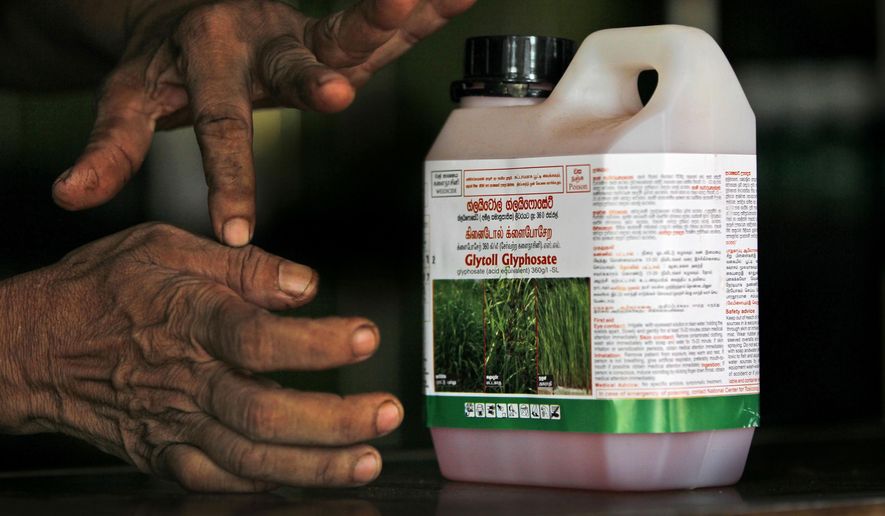The Environmental Protection Agency findings posted last month were welcome news for the herbicide industry: Glyphosate, a key ingredient in popular weed killers such as Roundup, was unlikely to cause cancer.
Days later, however, the final report of the Cancer Assessment Review Committee was removed from the EPA website. It hasn’t been seen since.
What happened to the report, and whether the EPA pulled it under political pressure from anti-industry forces, has become a hot topic within the industry as well as the subject of an investigation by the House Science, Space and Technology Committee.
Rep. Lamar Smith, the Texas Republican who chairs the committee, has fired off a letter demanding that four EPA officials involved in the glyphosate analysis take part in transcribed interviews. Last month, he asked the EPA for documents related to the report, which he says he has not received.
Mr. Smith noted that the Cancer Assessment Review Committee report, which was posted April 29 and removed May 2, contradicted an analysis released in March 2015 by the International Agency for Research on Cancer, which found that glyphosate was “probably carcinogenic to humans.”
“Given the apparent contradictions of the CARC and IARC findings for glyphosate and the participation of EPA officials in IARC’s report, the Committee has concerns about the integrity of the IARC process, the role played by agency officials in the IARC study, and the influence that EPA officials involved in the IARC process have on the agency’s analysis of glyphosate,” Mr. Smith said in the letter Tuesday.
EPA spokeswoman Melissa Harrison said the agency has received the letter and “we will review and respond.”
After removing the report last month, the EPA described the Cancer Assessment Review Committee documents as “preliminary” and said they were “inadvertently posted to the agency’s docket.”
“EPA has not completed our cancer review. We will look at the work of other governments as well as work by HHS’s (Health and Human Services) Agricultural Health Study as we move to make a decision on glyphosate. Our assessment will be peer reviewed and completed by end of 2016,” according to the EPA statement.
Critics have expressed skepticism over the agency’s explanation, noting that the memorandum dated Oct. 1, 2015, was labeled “Final Report,” that it was signed by 13 committee scientists and that each of its 88 pages had the word “FINAL” in the upper right-hand corner.
“The CARC concluded that the epidemiological studies in humans showed no association between glyphosate exposure and cancer of the following: oral cavity, esophagus, stomach, colon, rectum, colorectum, lung, pancreas, kidney, bladder, prostate, brain (gliomas), soft-tissue sarcoma, leukemia, or multiple myelomas,” the report said.
During its brief posting on the EPA website, the report came under fierce criticism from environmentalists. The Center for Biological Diversity blasted the EPA for its “industry-friendly determination” and said the agency “relied heavily on industry-funded studies that have not undergone public scrutiny.”
“We shouldn’t gamble with the risk of cancer and must take appropriate precautions until we get a conclusive answer about the true dangers of glyphosate,” the center’s Nathan Donley said in a May 2 statement. “The indiscriminate drenching of farms, ball fields and backyards with glyphosate needs to end.”
Mr. Donley argued that the report by the International Agency for Research on Cancer, the cancer research arm of the World Health Organization, should be viewed as the “gold standard.”
A top official at Monsanto, which makes Roundup, said last year that the assessment from the International Agency for Research on Cancer excluded “the most relevant, scientific data” and that research did not support its conclusion.
“As recently as January, the German government completed a rigorous, four-year evaluation of glyphosate for the European Union,” Philip Miller, Monsanto vice president of global regulatory affairs, said in a March 2015 statement. “They reviewed all the data IARC considered, plus significantly more, and concluded glyphosate was ’unlikely to pose a carcinogenic risk in humans.’”
The stakes for Monsanto are enormous. The European Union has threatened to halt sales of products containing glyphosate, and personal injury lawyers are putting together a “mass tort” action against Monsanto by cancer patients who have been exposed to Roundup, according to Reuters.
In his May 4 letter to EPA Administrator Gina McCarthy, Mr. Smith said the removal of the Cancer Assessment Review Committee’s report “appears to be yet another example of this agency’s attempt to allow politics rather than science to drive its decision making.”
“Sound, transparent science should always be the basis for EPA’s decisions,” Mr. Smith said.
• Valerie Richardson can be reached at vrichardson@washingtontimes.com.




Please read our comment policy before commenting.